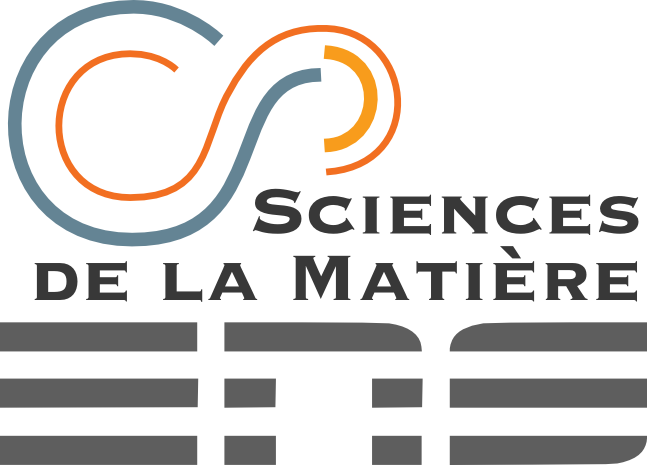Here is a small page to present an overview on the ENS of Lyon and what is done there in terms of research and teaching (at least the parts I know).
The campus
 The school is located in the South of Lyon, around 10-15 min away from the city center thank to the underground. You can see here some photographs from the campus where the library and the beautiful parc of the ENS can be found. Pictures from the scientific campus are a bit hard to find... I can only show you the entrance that I found chemistry lab's web page.
The school is located in the South of Lyon, around 10-15 min away from the city center thank to the underground. You can see here some photographs from the campus where the library and the beautiful parc of the ENS can be found. Pictures from the scientific campus are a bit hard to find... I can only show you the entrance that I found chemistry lab's web page.
Regarding student activities, numerous associations can be found in the ENS as well as many sport lessons (in french).
The Department of Matter Sciences
(DSM)
 This is the department where I'm studying. It covers 4 years: License 3 (last year of undergraduate studies), Master 1, Master 2 and one year to prepare the aggregation (a competitive exam to become a teacher). We are grouped in classes that go from 70 people (the first year is rather general) to around 20 in the last year where we are much more specialized.
This is the department where I'm studying. It covers 4 years: License 3 (last year of undergraduate studies), Master 1, Master 2 and one year to prepare the aggregation (a competitive exam to become a teacher). We are grouped in classes that go from 70 people (the first year is rather general) to around 20 in the last year where we are much more specialized.
The DSM proposes a large panel of courses (they are displayed on the department's website), from theoretical physics to organic chemistry, without forgetting optics or the physicochemical properties of materials. Besides, the DSM began a closer relationship with the biology department, hence the existence of many interdisciplinary courses; a Physics and Chemistry of Biological systems
(PCB) curriculum is even proposed during the Master's degree.
For those who may be interested, here are some personal pages of the department's teachers (who are of course all researchers):
- Tommaso Roscilde (Quantum Mechanics)
- Cendrine Moskalenko (PCB)
- Elise Dumont (Quantum chemistry and spectroscopy)
- Thierry Dauxois (Dynamical systems and chaos)
The curriculum of Matter scientists
Below is a small list of the courses that are accessible in the department during the first year. You are free to chose those you like most, provided that they give you enough ECTS-credits to validate your year. However, I think QM (S1), computer science (S1), statistical physics (S2) and english (S1/S2) are compulsory during the first year (L3). Practicals (either in physics or in chemistry depending on your specialty) are compulsory in first and second year (1st semester). For more details about the courses, please see the French page and ask your favourite translator... I really don't feel like doing it again in english!
- L3 - 1st semester (S1)
- Quantum Mechanics
- Organic Chemistry
- Analytical Mechanics and Relativity
- Continuum Mechanics
Physics and Chemistry of Biological systems
(PCB)- Computer Science
- Chemical kinetics
- Mathematical tools for physicists
- Electrochemistry
- L3 - 2nd semester (S2)
- Statistical physics
- Group theory and Spectroscopy
- Inorganic chemistry
- Optics (linear and anisotropic)
- Atoms and chemical bonds
- PIC
- Electromagnetism
- Signal processing
Interdisciplinarity
Though I only listed the courses for the DSM, it goes without saying that this is only a small part of what you can follow in the ENS.
Many students of my year where mathematicians so they chose to follow maths courses directly in the maths department, other followed courses in biology or in Earth science. The ENS also proposes a significant number of language classes from beginner level (A1) up to rather advanced levels depending on the language (B1/B2 and even C1). Finally, alterdisciplinary
courses have been created by many departments to offer an introduction to their field for non-specialists.
Lectures
Be it in physics, chemistry, biology or elsewhere, many lectures take place in the ENS during the year. Departments usually organize their own lectures specially for the students and researchers (generally once or twice a month for physics and between 5 and 10 a year for chemistry); incidentally, you may have a look here for the physics department. As far as chemistry is concerned, the ENS also hosts an annual congress, Tomorrow...Towards a selected chemistry where you can usually meet one (or two) Nobel Prize in Chemistry (Dan Shechtman and Yves Chauvin in 2012). Other than those special
, the labs also organize colloquia that you can sometimes attend if you don't have a class at the same time.


